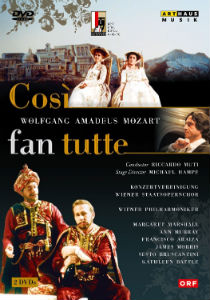The word traditional, when used to describe opera productions can imply a certain setting, costuming, stage action, or even overall dramatic conception (or lack thereof). Tradition at its best can provide a straightforward backdrop for the genius of a work to unfold, and at its worst weigh an opera down with outdated and vapid conventions.
Unfortunately, this production of Mozart’s Cosi fan tutte from the 1983 Salzburg Festival, directed by Michael Hampe, is traditional in the worst way. It is a safe production which offers cheesy staging that conveniently skates over the conflict and ambiguity inherent in Mozart’s work.
To take just one glaring example, the ending is staged like a concert, with all the singers lined up in a row singing straight to the audience, letting us know the “moral” of the story. It is as if the director didn’t want to have to deal with the difficulty of staging this intentionally vague ending, and so opted for the easiest cop-out he could think of. That being said, even taking this Cosi as a relic of a different operatic era, there is not much that is terribly spectacular.
Musically, things are only a bit happier, with Riccardo Muti providing a vivacious, well-articulated account of the score, thankfully eschewing the dirge-like tempos of his predecessors. Unfortunately, the two sisters have serious faults of either singing, acting, or both, and neither are really a complete package.
The schemers fare better, with Sesto Bruscantini giving a warmer portrayal of Don Alfonso than is usually seen today. His is a wily, harmless Don Alfonso, less cynical and calculating than improvisational in his schemes. Kathleen Battle sparkles vocally, but her two-dimensional acting mainly comprised of cutesy mugging makes her Despina into a caricature—not ideal but acceptable in this role.
Caricature is also the word that best describes Ann Murray‘s vocally robust Dorabella, sung well enough but acted very much like the renowned Marcellina she would later become. Margaret Marshall as Fiordiligi is similarly challenged, seemingly only able to scowl or smile politely, and often at very inopportune moments. Who knew “Per pieta…” was some kind of reverie? Her wooden voice with its rapid vibrato is rather stressful-sounding, and is not pliable enough to express the difficult range of Fiordiligi’s emotions.
httpv://www.youtube.com/watch?v=PZ1A4PaFD_M
As the soldiers, James Morris and Francisco Araiza make a solid duo, even if Morris’s gravelly bass-baritone is completely wrong for the part of Guglielmo. Araiza’s acting is generally stiff and inexpressive, but his beautiful voice thankfully is not, and he is posed very few problems by the role of Ferrando, dispatching rapid runs and long lyrical lines with equal facility. The recorded sound is a bit raw though, and does his bright voice the least favors.
Ultimately with an opera like Cosi, if there’s nothing at stake and no emotional journey, it ends up feeling tedious even with every standard cut taken, as in this production. Luckily for those who prefer a Cosi with emotional depth and dramatically specific direction, there are many recommendable performances on DVD which boast overall musical values at least as good or better than this one: Nicholas Hytner’s “traditional” production from Glyndebourne and both Doris Dörrie and Claus Guth’s regie takes from Berlin and Salzburg respectively.



